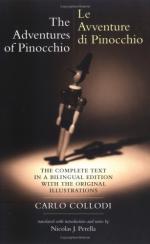And now, my little readers, you will have understood the fine trade that little man pursued. The wicked little monster, who had a face all milk and honey, made frequent journeys round the world with his coach. As he went along he collected, with promises and flattery, all the idle boys who had taken a dislike to books and school. As soon as his coach was full he conducted them to the “Land of Boobies,” that they might pass their time in games, in uproar, and in amusement. When these poor, deluded boys, from continual play and no study, had become so many little donkeys, he took possession of them with great delight and satisfaction, and carried them off to the fairs and markets to be sold. And in this way he had in a few years made heaps of money and had become a millionaire.
What became of Candlewick I do not know, but I do know that Pinocchio from the very first day had to endure a very hard, laborious life.
When he was put into his stall his master filled the manger with straw; but Pinocchio, having tried a mouthful, spat it out again.
Then his master, grumbling, filled the manger with hay; but neither did the hay please him.
“Ah!” exclaimed his master in a passion. “Does not hay please you either? Leave it to me, my fine donkey; if you are so full of caprices I will find a way to cure you!”
And by way of correcting him he struck his legs with his whip.
Pinocchio began to cry and to bray with pain, and he said, braying:
“Hee-haw! I cannot digest straw!”
“Then eat hay!” said his master, who understood perfectly the asinine dialect.
“Hee-haw! hay gives me a pain in my stomach.”
“Do you mean to pretend that a little donkey like you must be kept on breasts of chickens, and capons in jelly?” asked his master, getting more and more angry, and whipping him again.
At this second whipping Pinocchio prudently held his tongue and said nothing more.
The stable was then shut and Pinocchio was left alone. He had not eaten for many hours and he began to yawn from hunger. And when he yawned he opened a mouth that seemed as wide as an oven.
At last, finding nothing else in the manger, he resigned himself and chewed a little hay; and after he had chewed it well, he shut his eyes and swallowed it.
“This hay is not bad,” he said to himself; “but how much better it would have been if I had gone on with my studies! Instead of hay I might now be eating a hunch of new bread and a fine slice of sausage. But I must have patience!”
The next morning when he woke he looked in the manger for a little more hay; but he found none, for he had eaten it all during the night.
Then he took a mouthful of chopped straw, but whilst he was chewing it he had to acknowledge that the taste of chopped straw did not in the least resemble a savory dish of macaroni or pie.
“But I must have patience!” he repeated as he went on chewing. “May my example serve at least as a warning to all disobedient boys who do not want to study. Patience!”




